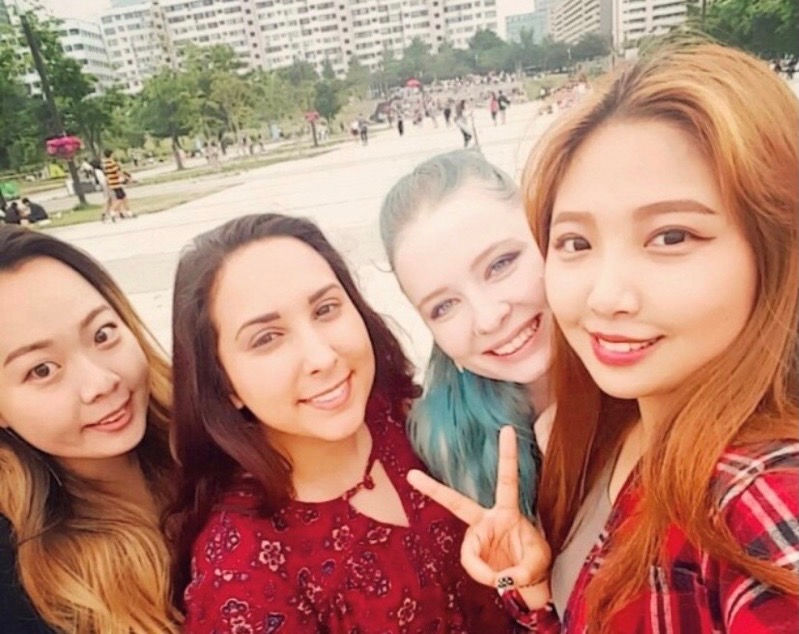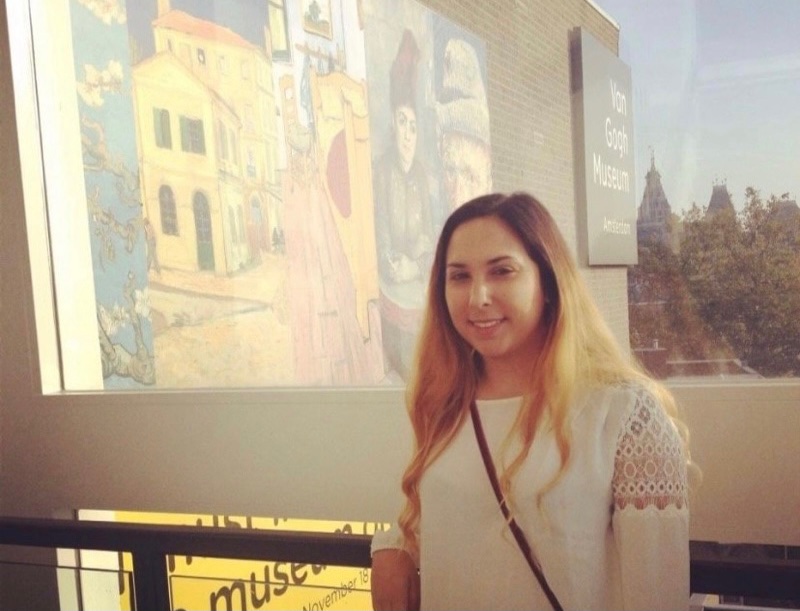Making the Most of Your Time Abroad
By: Amber Leisher, Penn Abroad Global Programs Coordinator

Amber (second from left) with her suitemates near the Han River in Seoul, South Korea
Studying and living abroad is an experience shared by all of our Penn Abroad staff, and what motivates us to assist Penn students in doing the same. Over the spring semester, our team members are reflecting on their own global experiences to share insights, takeaways, and advice for Penn students interested in studying and working abroad. Global Programs Coordinator Amber Leisher has five strategies to make the most of your time abroad.
1. Explore your host city.
I had never previously traveled outside of the United States prior to studying abroad so it was naturally enticing to try to fit a lifetime’s worth of awaited travel into my semester abroad. While it may be easy to travel to major cities and neighboring countries, get to know the city that you will be calling home for a semester or two. It was important for me to find a good balance of making meaningful connections within my host city as well as enjoying the weekends I chose to explore international sites. By investing much of my time to learn more about the city and country I would be living in for the next few months, I left my semester abroad not just considering myself a visitor in the host city, but rather with a great understanding and appreciation for the local people, food, and sites.

2. Put yourself out there.
Studying abroad is an opportunity to put yourself out there to meet new people and create new friendships. Though it is easy to connect with Penn students or other American students abroad, this is a valuable opportunity to meet people from all over the world whose opinions, beliefs, and way of life likely differ from yours. It was critical for me to put myself out there to not only create meaningful friendships, but to learn about myself and others. My semesters abroad helped me reflect on my identities and how they influenced my global experiences. Actively challenging your way of thinking and taking in new perspectives facilitates an understanding of how you relate to the world around you.
3. Be a local student.
Just as the Penn experience includes joining organizations and clubs as well as taking classes that are unique to your degree and interests, so should your semester abroad. Take the opportunities to enroll in coursework connected to your host country as well as academic coursework from a new perspective. While taking courses focused on my undergraduate major, Psychology, I gained a unique understanding of psychology and neuroscience from a Dutch viewpoint. In South Korea, I took advantage of studying international relations and learning from professors who previously worked for the United Nations, enrolling in courses concentrating on East Asia and the division of the Korean peninsula. Similarly, joining clubs and attending events on campus helped me make friends with local University students and continue my interests, or join new clubs not offered at my undergraduate university! Additionally, while both of my programs were taught in English, studying the language and learning common phrases prior to studying abroad allowed me to feel more connected to my new environment.
4. Embrace the challenges.
Studying abroad is not without its challenges. After all, you are traveling to a foreign destination where the language, culture, and academics may differ. While challenges such as culture shock and language barriers can be difficult, it is how I embraced these challenges that benefitted my study abroad experience. I appreciated that what used to be unknown to me was now part of my daily life, and I celebrated the accomplishments, big and small, from understanding an entirely different academic system to biking to campus without getting lost. It was empowering to overcome challenges through finding new ways of viewing or confronting issues by framing them in a new perspective or being adaptable through adjustment. With this thinking, I ended up transforming these challenges into memorable parts of my experience – such as finding a bike, a major mode of transportation in the Netherlands, as someone who is 5’0” in a country renowned for the highest average height!
5. Document your experience.
I was gifted a journal before I left to study abroad in the Netherlands, and this journal ended up serving as a reflection of my semester abroad. While I documented my time abroad through photos for friends and family, writing in a journal allowed me to capture how I felt during my time abroad, including the excited feeling of arriving to my host city or the bittersweet moment of saying goodbye to all my friends I made abroad. I carried this practice with me when I studied abroad in South Korea, and it helped me better understand and work through challenges when adjusting to a new country and way of life. It is truly memorable to look back several years later and re-live my abroad experiences when reading my journals. In addition to writing, I enjoyed reflecting on my experience through keepsakes I have collected during my semesters abroad, including various ticket stubs, boarding passes, and end of semester notes from friends. There are many ways you can choose to document and share your global experiences that will become a valuable part of your time abroad.